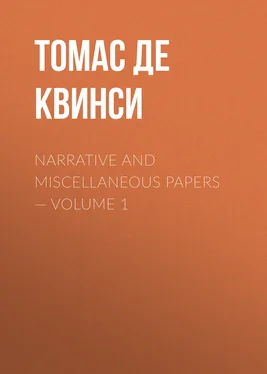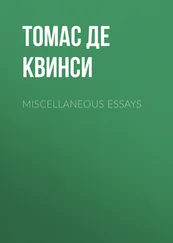Томас Де Квинси - Narrative and Miscellaneous Papers — Volume 1
Здесь есть возможность читать онлайн «Томас Де Квинси - Narrative and Miscellaneous Papers — Volume 1» — ознакомительный отрывок электронной книги совершенно бесплатно, а после прочтения отрывка купить полную версию. В некоторых случаях можно слушать аудио, скачать через торрент в формате fb2 и присутствует краткое содержание. Жанр: foreign_prose, literature_19, foreign_antique, на английском языке. Описание произведения, (предисловие) а так же отзывы посетителей доступны на портале библиотеки ЛибКат.
- Название:Narrative and Miscellaneous Papers — Volume 1
- Автор:
- Жанр:
- Год:неизвестен
- ISBN:нет данных
- Рейтинг книги:3 / 5. Голосов: 1
-
Избранное:Добавить в избранное
- Отзывы:
-
Ваша оценка:
- 60
- 1
- 2
- 3
- 4
- 5
Narrative and Miscellaneous Papers — Volume 1: краткое содержание, описание и аннотация
Предлагаем к чтению аннотацию, описание, краткое содержание или предисловие (зависит от того, что написал сам автор книги «Narrative and Miscellaneous Papers — Volume 1»). Если вы не нашли необходимую информацию о книге — напишите в комментариях, мы постараемся отыскать её.
Narrative and Miscellaneous Papers — Volume 1 — читать онлайн ознакомительный отрывок
Ниже представлен текст книги, разбитый по страницам. Система сохранения места последней прочитанной страницы, позволяет с удобством читать онлайн бесплатно книгу «Narrative and Miscellaneous Papers — Volume 1», без необходимости каждый раз заново искать на чём Вы остановились. Поставьте закладку, и сможете в любой момент перейти на страницу, на которой закончили чтение.
Интервал:
Закладка:
Meantime, what was the first thing to be done? Manifestly, to see Agnes: her account of the affair might suggest the steps to be taken. Prudence, therefore, at any rate, prescribed this course; and my heart would not have tolerated any other. I applied, therefore, at once, for information as to the proper mode of effecting this purpose without delay. What was my horror at learning that, by a recent regulation of all the police-offices, under the direction of the public minister who presided over that department of the national administration, no person could be admitted to an interview with any accused party during the progress of the official examinations; or, in fact, until the final committal of the prisoner for trial. This rule was supposed to be attended by great public advantages, and had rarely been relaxed— never, indeed, without a special interposition of the police minister authorizing its suspension. But was the exclusion absolute and universal? Might not, at least, a female servant, simply as the bearer of such articles as were indispensable to female delicacy and comfort, have access to her mistress? No; the exclusion was total and unconditional. To argue the point was manifestly idle; the subordinate officers had no discretion in the matter; nor, in fact, had any other official person, whatever were his rank, except the supreme one; and to him I neither had any obvious means of introduction, nor (in case of obtaining such an introduction) any chance of success; for the spirit of the rule, I foresaw it would be answered, applied with especial force to cases like the present.
Mere human feelings of pity, sympathy with my too visible agitation, superadded to something of perhaps reverence for the blighting misery that was now opening its artillery upon me—for misery has a privilege, and everywhere is felt to be a holy thing—had combined to procure for me some attention and some indulgence hitherto. Answers had been given with precision, explanations made at length, and anxiety shown to satisfy my inquiries. But this could not last; the inexorable necessities of public business coming back in a torrent upon the official people after this momentary interruption, forbade them to indulge any further consideration for an individual case, and I saw that I must not stay any longer. I was rapidly coming to be regarded as a hinderance to the movement of public affairs; and the recollection that I might again have occasion for some appeal to these men in their official characters, admonished me not to abuse my privilege of the moment. After returning thanks, therefore, for the disposition shown to oblige me, I retired.
Slowly did I and Hannah retrace our steps. Hannah sustained, in the tone of her spirits, by the extremity of her anger, a mood of feeling which I did not share. Indignation was to her in the stead of consolation and hope. I, for my part, could not seek even a momentary shelter from my tempestuous affliction in that temper of mind. The man who could accuse my Agnes, and accuse her of such a crime, I felt to be a monster; and in my thoughts he was already doomed to a bloody atonement (atonement! alas! what atonement!) whenever the time arrived that her cause would not be prejudiced, or the current of public feeling made to turn in his favor by investing him with the semblance of an injured or suffering person. So much was settled in my thoughts with the stern serenity of a decree issuing from a judgment-seat. But that gave no relief, no shadow of relief, to the misery which was now consuming me. Here was an end, in one hour, to the happiness of a life. In one hour it had given way, root and branch—had melted like so much frost-work, or a pageant of vapory exhalations. In a moment, in the twinkling of an eye, and yet for ever and ever, I comprehended the total ruin of my situation. The case, as others might think, was yet in suspense; and there was room enough for very rational hopes, especially where there was an absolute certainty of innocence. Total freedom from all doubt on that point seemed to justify almost more than hopes. This might be said, and most people would have been more or less consoled by it. I was not. I felt as certain, as irredeemably, as hopelessly certain of the final results as though I had seen the record in the books of Heaven. 'Hope nothing,' I said to myself; 'think not of hope in this world, but think only how best to walk steadily, and not to reel like a creature wanting discourse of reason, or incapable of religious hopes under the burden which it has pleased God to impose, and which in this life cannot be shaken off. The countenance of man is made to look upward and to the skies. Thither also point henceforwards your heart and your thoughts. Never again let your thoughts travel earthwards. Settle them on the heavens, to which your Agnes is already summoned. The call is clear, and not to be mistaken. Little in her fate now depends upon you, or upon anything that man can do. Look, therefore, to yourself; see that you make not shipwreck of your heavenly freight because your earthly freight is lost; and miss not, by any acts of wild and presumptuous despair, that final reunion with your Agnes, which can only be descried through vistas that open through the heavens.'
Such were the thoughts, thoughts often made audible, which came spontaneously like oracles from afar, as I strode homewards with Hannah by my side. Her, meantime, I seemed to hear; for at times I seemed and I intended to answer her. But answer her I did not; for not ten words of all that she said did I really and consciously hear. How I went through that night is more entirely a blank in my memory, more entirely a chapter of chaos and the confusion of chaos, than any other passage the most impressive in my life. If I even slumbered for a moment, as at intervals I did sometimes, though never sitting down, but standing or pacing about throughout the night, and if in this way I attained a momentary respite from self-consciousness, no sooner had I reached this enviable state of oblivion, than some internal sting of irritation as rapidly dispersed the whole fickle fabric of sleep; and as if the momentary trance—this fugitive beguilement of my wo—had been conceded by a demon's subtle malice only with the purpose of barbing the pang, by thus forcing it into a stronger relief through the insidious peace preceding it. It is a well known and most familiar experience to all the sons and daughters of affliction, that under no circumstances is the piercing, lancinating torment of a recent calamity felt so keenly as in the first moments of awaking in the morning from the night's slumbers. Just at the very instant when the clouds of sleep, and the whole fantastic illusions of dreaminess are dispersing, just as the realities of life are re-assuming their steadfast forms— re-shaping themselves—and settling anew into those fixed relations which they are to preserve throughout the waking hours; in that particular crisis of transition from the unreal to the real, the wo which besieges the brain and the life-springs at the heart rushes in afresh amongst the other crowd of realities, and has at the moment of restoration literally the force and liveliness of a new birth—the very same pang, and no whit feebler, as that which belonged to it when it was first made known. From the total hush of oblivion which had buried it and sealed it up, as it were, during the sleeping hours, it starts into sudden life on our first awaking, and is to all intents and purposes a new and not an old affliction—one which brings with it the old original shock which attended its first annunciation.
That night—that first night of separation from my wife— how it passed, I know not; I know only that it passed, I being in our common bed-chamber, that holiest of all temples that are consecrated to human attachments, whenever the heart is pure of man and woman, and the love is strong—I being in that bedchamber, once the temple now the sepulchre of our happiness,—I there, and my wife—my innocent wife—in a dungeon. As the morning light began to break, somebody knocked at the door; it was Hannah: she took my hand—misery levels all feeble distinctions of station, sex, age—she noticed my excessive feverishness, and gravely remonstrated with me upon the necessity there was that I should maintain as much health as possible for the sake of 'others,' if not for myself. She then brought me some tea, which refreshed me greatly; for I had tasted nothing at all beyond a little water since the preceding morning's breakfast. This refreshment seemed to relax and thaw the stiff frozen state of cheerless, rayless despair in which I had passed the night; I became susceptible of consolation— that consolation which lies involved in kindness and gentleness of manner—if not susceptible more than before of any positive hope. I sat down; and, having no witnesses to my weakness but this kind and faithful woman, I wept, and I found a relief in tears; and she, with the ready sympathy of woman, wept along with me. All at once she ventured upon the circumstances (so far as she had been able to collect them from the reports of those who had been present at the examination) of our calamity. There was little indeed either to excite or to gratify any interest or curiosity separate from the personal interest inevitably connected with a case to which there were two such parties as a brutal, sensual, degraded ruffian, on one side in character of accuser, and on the other as defendant, a meek angel of a woman, timid and fainting from the horrors of her situation, and under the licentious gaze of the crowd—yet, at the same time, bold in conscious innocence, and in the very teeth of the suspicions which beset her, winning the good opinion, as well as the good wishes of all who saw her. There had been at this first examination little for her to say beyond the assigning her name, age, and place of abode; and here it was fortunate that her own excellent good sense concurred with her perfect integrity and intuitive hatred of all indirect or crooked courses in prompting her to an undisguised statement of the simple truth, without a momentary hesitation or attempt either at evasion or suppression. With equally good intentions in similar situations many a woman has seriously injured her cause by slight evasions of the entire truth, where nevertheless her only purpose has been the natural and ingenuous one of seeking to save the reputation untainted of a name which she felt to have been confided to her keeping. The purpose was an honorable one, but erroneously pursued. Agnes fell into no such error. She answered calmly, simply, and truly, to every question put by the magistrates; and beyond that there was little opportunity for her to speak; the whole business of this preliminary examination being confined to the deposition of the accuser as to the circumstances under which he alleged the act of felonious appropriation to have taken place. These circumstances were perfectly uninteresting, considered in themselves; but amongst them was one which to us had the most shocking interest, from the absolute proof thus furnished of a deep-laid plot against Agnes. But for this one circumstance there would have been a possibility that the whole had originated in error—error growing out of and acting upon a nature originally suspicious, and confirmed perhaps by an unfortunate experience. And in proportion as that was possible, the chances increased that the accuser might, as the examinations advanced, and the winning character of the accused party began to develop itself, begin to see his error, and to retract his own over-hasty suspicions. But now we saw at a glance that for this hope there was no countenance whatever, since one solitary circumstance sufficed to establish a conspiracy. The deposition bore—that the lace had been secreted and afterwards detected in a muff; now it was a fact as well known to both of us as the fact of Agnes having gone out at all—that she had laid aside her winter's dress for the first time on this genial sunny day. Muff she had not at the time, nor could have had appropriately from the style of her costume in other respects. What was the effect upon us of this remarkable discovery! Of course there died at once the hope of any abandonment by the prosecutor of his purpose; because here was proof of a predetermined plot. This hope died at once; but then, as it was one which never had presented itself to my mind, I lost nothing by which I had ever been solaced. On the other hand, it will be obvious that a new hope at the same time arose to take its place, viz., the reasonable one that by this single detection, if once established, we might raise a strong presumption of conspiracy, and moreover that, as a leading fact or clue, it might serve to guide us in detecting others. Hannah was sanguine in this expectation; and for a moment her hopes were contagiously exciting to mine. But the hideous despondency which in my mind had settled upon the whole affair from the very first, the superstitious presentiment I had of a total blight brooding over the entire harvest of my life and its promises, (tracing itself originally, I am almost ashamed to own, up to that prediction of the Hungarian woman)—denied me steady light, anything—all in short but a wandering ray of hope. It was right, of course, nay, indispensable, that the circumstance of the muff should be strongly insisted upon at the next examination, pressed against the prosecutor, and sifted to the uttermost. An able lawyer would turn this to a triumphant account; and it would be admirable as a means of pre- engaging the good opinion as well as the sympathies of the public in behalf of the prisoner. But, for its final effect—my conviction remained, not to be shaken, that all would be useless; that our doom had gone forth, and was irrevocable.
Читать дальшеИнтервал:
Закладка:
Похожие книги на «Narrative and Miscellaneous Papers — Volume 1»
Представляем Вашему вниманию похожие книги на «Narrative and Miscellaneous Papers — Volume 1» списком для выбора. Мы отобрали схожую по названию и смыслу литературу в надежде предоставить читателям больше вариантов отыскать новые, интересные, ещё непрочитанные произведения.
Обсуждение, отзывы о книге «Narrative and Miscellaneous Papers — Volume 1» и просто собственные мнения читателей. Оставьте ваши комментарии, напишите, что Вы думаете о произведении, его смысле или главных героях. Укажите что конкретно понравилось, а что нет, и почему Вы так считаете.












